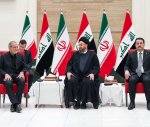You are here
Washington’s strategy: Containing Iran’s response and avoiding direct confrontation
Aug 19,2024 - Last updated at Aug 19,2024
Washington has successfully activated its strategy to contain and prevent Iran’s response to Israel. The arrival of US military forces in the region has sent a clear message about Washington's firm stance on the consequences that Tehran would face if it carried out any military action against Israel. This message was reinforced by signals that the US is prepared to use its military power to contain any Iranian attack, or even target Iran directly in response. Simultaneously, the US has exerted pressure on all parties to revive negotiations for a ceasefire in Gaza, aiming to use this as a foundation for gradually calming all fronts, particularly the Lebanese front, where the US president’s envoy visited to link the Gaza ceasefire with de-escalation on the Lebanese border.
Tehran, facing genuine security and political challenges for the first time in years, finds itself compelled to take American threats very seriously. This has driven Iran to seek to maximise its political gains in exchange for accepting a de-escalation scenario and opening the door to new understandings with the US administration, including multiple conflict zones from Gaza to Lebanon, Yemen and Iraq.
Despite diplomatic efforts to lay the groundwork for initiating ceasefire negotiations in Gaza, which, according to the US vision, could facilitate the opening of discussions on other fronts and increase the chances of success for this gradual settlement, the complexities across all fronts have grown considerably. The ceasefire in Gaza alone is no longer sufficient to present a solution for de-escalation on other fronts opened during this conflict which cannot be resolved without a comprehensive solution, particularly in Lebanon.
Israel, which opened the Lebanese front and reestablished direct confrontation with Iran, is participating in negotiations at the behest of the US, but without clear indications that it intends to withdraw from them without achieving tangible results on the ground. Israel views the current situation as one where the scenario of October 7th could easily repeat itself, and it cannot afford to live with that risk under any circumstances. This suggests that the temporary solutions proposed by the US may not lead to long-term calm and may not even prevent inevitable confrontations if it becomes clear that reaching agreements acceptable to all parties is impossible. This could lead to a rapid escalation of the ongoing conflict.
While discussions are under way about the need to find a solution to the war in Gaza, the West Bank is experiencing rapid escalation. Israeli security attention is increasingly focused on how to confront factions there, and with growing talk of the introduction of advanced weapons such as anti-tank and anti-aircraft systems, this effectively sets the stage for a larger confrontation and significant Israeli military involvement. This is especially pertinent given recent statements by Israeli Foreign Minister Israel Katz where he proposed dismantling refugee camps in the West Bank, which he described as terrorist hotspots used by Iran to undermine Israel's security and repeat the scenario of October 7th from the West Bank.
The American attempt to contain the risk of escalation between Iran and Israel may succeed temporarily in preventing a cross-border confrontation between the two parties, but it undoubtedly cannot change the reality that has been taking shape for years and has become evident in recent months.
Transitioning from a short-term truce to a long-term peace after months of war requires political guarantees for Iran and security guarantees for Israel, something that the US administration is currently struggling to provide. America’s efforts may merely postpone the confrontation, especially with Israel's increasing desire to secure the various fronts in the long term and Iran's attempt to apply short-term tactics to take advantage of the remaining months of the Democratic administration to achieve any settlement that could dissipate the likelihood of direct war.














Add new comment